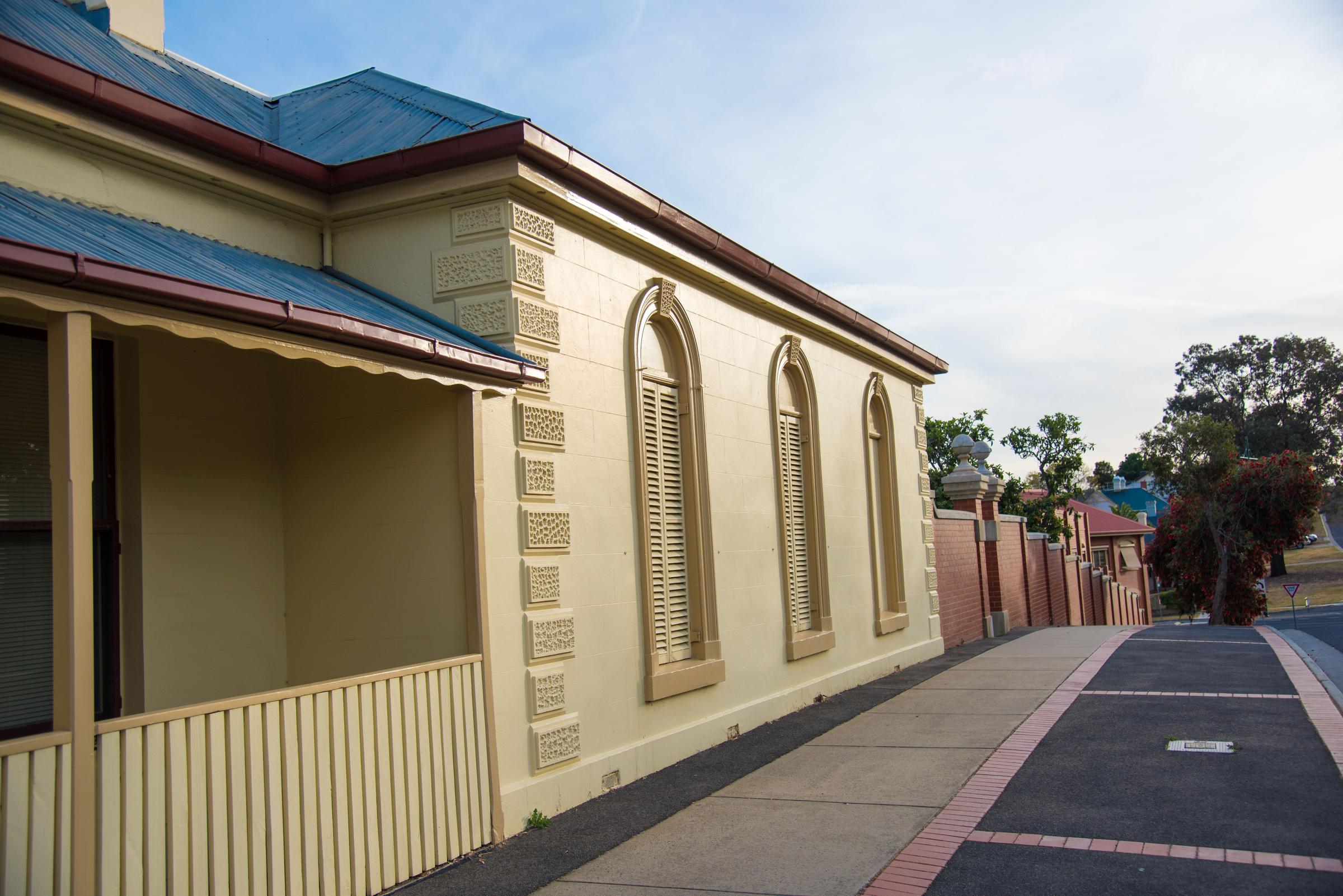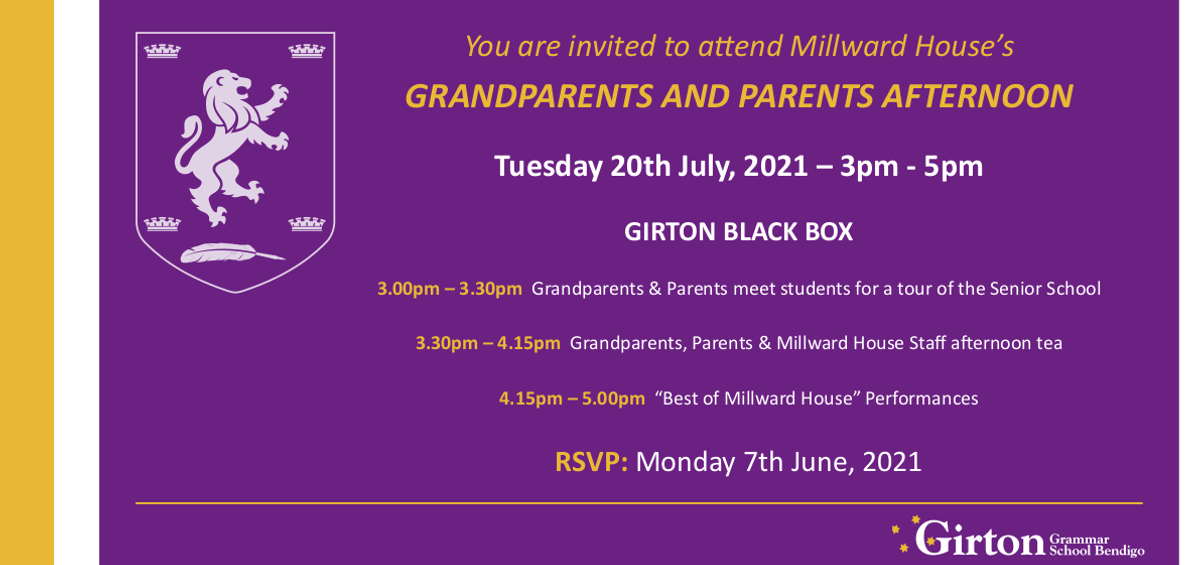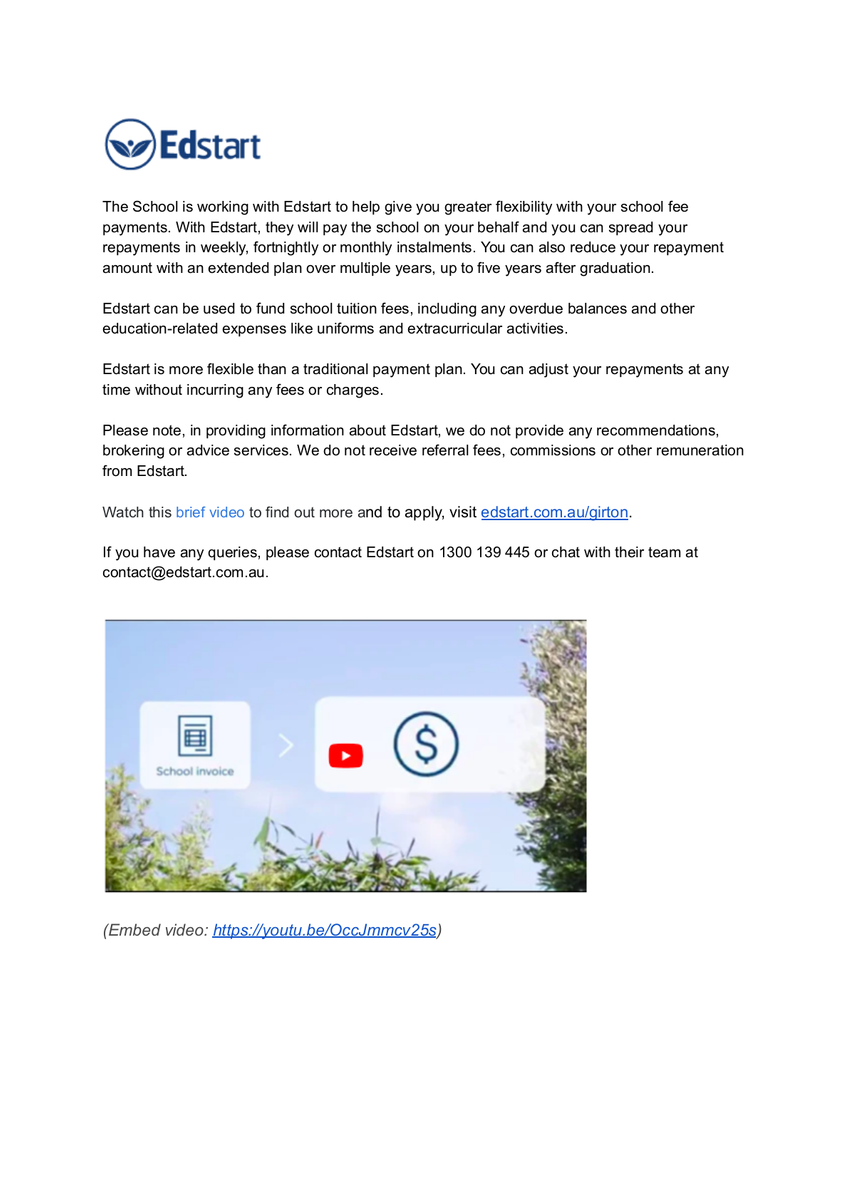Parent and Student Notices

Millward Grandparents & Special Friends Afternoon
We are looking forward to welcoming Millward grandparents and special friends on Tuesday 20th June (Week 2, Term 3). Please RSVP via the following link by Monday 7th June.
https://astra.girton.vic.edu.au/survey/intro/2546
Ms Motoko Watanabe
Head of Millward
Student Wellbeing:
Students with high emotional intelligence get better grades
Published by The University of Sydney
3 February 2020
Understanding emotions helps student achieve academically
As students head back to school and university, a new study has found it may not be enough to be smart, persistent and hard-working.
Research published by the American Psychological Association has shown that students who are better able to understand and manage their emotions effectively, a skill known as emotional intelligence, do better than their less skilled peers, as measured by grades and standardised test scores.
“Although we know that high intelligence and a conscientious personality are the most important psychological traits necessary for academic success, our research highlights a third factor, emotional intelligence, that may also help students succeed,” said lead author Associate Professor Carolyn MacCann in the School of Psychology.
The research was published in the highly respected journal Psychological Bulletin. Co-authors included Dr Kit Double at University of Oxford and Associate Professor Amirali Minbashian at UNSW.
Emotional Intelligence
The concept of emotional intelligence as an area of academic research is relatively new, dating to the 1990s, says Associate Professor MacCann. Although there are other studies that suggest that social and emotional learning programs in schools are effective at improving academic performance, she believes this may be the first comprehensive meta-analysis on whether higher emotional intelligence generally relates to academic success.
Associate Professor MacCann and her colleagues analysed data from more than 160 studies, representing more than 42,000 students from 27 countries, published between 1998 and 2019. More than 76 per cent were from English-speaking countries. The students ranged in age from primary school to university.
The researchers found that students with higher emotional intelligence tended to get higher grades and better achievement test scores than those with lower emotional intelligence scores. This finding held true even when controlling for intelligence and personality factors.
What was most surprising to the researchers was that the association held regardless of age.
Performance factors
As for why emotional intelligence can affect academic performance, Associate Professor MacCann believes a number of factors may come into play.
“Students with higher emotional intelligence may be better able to manage negative emotions, such as anxiety, boredom and disappointment, that can negatively affect academic performance,” she said.
“Also, these students may be better able to manage the social world around them, forming better relationships with teachers, peers and family, all of which are important to academic success.”
Finally, the skills required for emotional intelligence, such as understanding human motivation and emotion, may overlap with the skills required to master certain subjects, such as history and language, giving students an advantage in those subject areas, according Associate Professor MacCann.
A case study
Associate Professor MacCann described the school day of a hypothetical student named Kelly, who is good at maths and science but low in emotional intelligence.
“She has difficulty seeing when others are irritated, worried or sad. She does not know how people’s emotions may cause future behaviour. She does not know what to do to regulate her own feelings,” said Associate Professor MacCann.
As a result, Kelly does not recognize when her best friend, Lucia, is having a bad day, making Lucia mad at her for her insensitivity. Lucia then does not help Kelly (as she usually does) later in English literature class, a class she often struggles in because it requires her to analyse and understand the motivations and emotions of characters in books and plays.
“Kelly feels ashamed that she can’t do the work in English literature that other students seem to find easy. She is also upset that Lucia is mad at her. She can’t seem to shake these feelings, and she is not able to concentrate on her maths problems in the next class,” said Associate Professor MacCann.
“Because of her low emotion management ability, Kelly cannot bounce back from her negative emotions and finds herself struggling even in subjects she is good at.”
Results in practice
Associate Professor MacCann cautions against widespread testing of students to identify and target those with low emotional intelligence as it may stigmatise those students.
Instead, she recommends interventions that involve the whole school, including additional teacher training and a focus on teacher well-being and emotional skills.
“Programs that integrate emotional skill development into the existing curriculum would be beneficial, as research suggests that training works better when run by teachers rather than external specialists,” she said.
“Increasing skills for everyone – not just those with low emotional intelligence – would benefit everyone.”
Declaration: This research was funded in part by an Australian Research Council Discovery Grant (DP150101158) awarded to Associate Professor Carolyn MacCann and Associate Professor Amirali Minbashian at UNSW.
Winter Uniform Fitting Appointments
Educational and Psychological Services
Girton’s Pastoral Care systems includes my services as an experienced Educator and Psychologist who is highly qualified to assist students and families.
My services have these features:
- I am full time at School with easy accessibility in Morey Building.
- I provide a confidential Counselling, Ed.- Psych assessments & Consultancy service across the School. A seamless integration process also occurs with 65 Wattle and Inclusive Education personnel.
- I utilise the latest testing equipment which includes bio-feedback tools for students to observe in real time the connectedness between their body and mind.
- A fully accredited & quality service delivery is delivered according to the full registration requirements of the Psych Board of Australia & the Code of Ethics of the APS (Full member).
- I am registered with Private Health Funds and with Medicare.
- Regular supervision occurs to ensure relevance and currency of methodology.
- I have a ready willingness & commitment to enhance student mental health in partnership with families, School and medical personnel.
- I am experienced assisting the development and implementation of Mental Health Care Plans developed by local GP’s with parents.
- I also assist the School with any Senior Students who apply to VCAA for Exam Consideration due to Specific Learning Difficulties.
Should your child experience ANY adjustment difficulty, a learning difficulty or any sudden change of behaviour, please ring me on 0419108460, or email me on johnpease@girton.vic.edu.au to either explore the issue or to make an appointment.
I look forward to ensuring that your child is validated for their efforts, that they reach an optimal level of self regulation and receive appropriate strategies to address their particular challenge.
John Pease, Registered Psychologist, PSY 0001119420 M.A.P.S.




